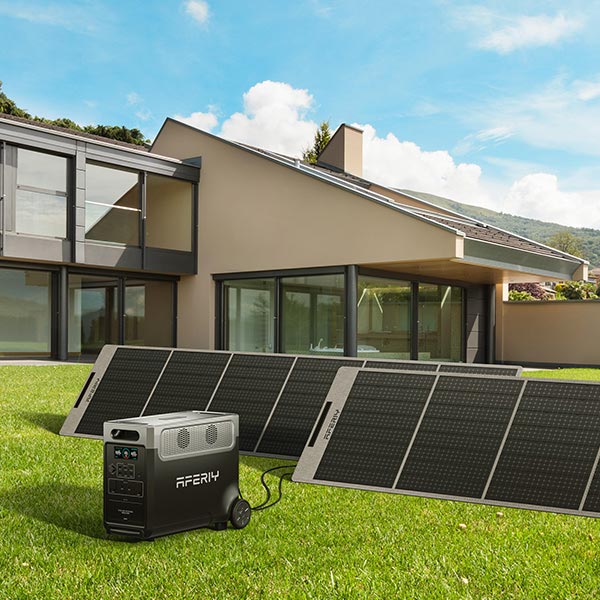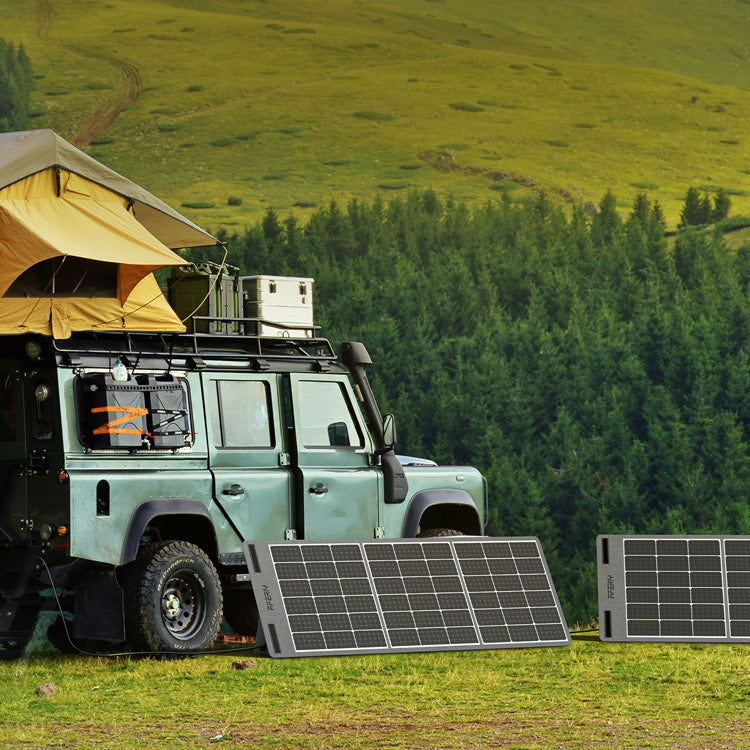Solar Panels Guide: Go Green with Confidence!
In the ever-evolving landscape of energy sources, solar panels have emerged as a beacon of hope for a sustainable future. As we dive into 2023, the importance of understanding solar panels, their pros and cons, and their role in meeting our energy needs cannot be overstated. This comprehensive guide aims to shed light on the world of portable solar panels, both traditional and portable, providing you with a well-rounded perspective to make informed decisions about harnessing the power of the sun.

What Is A Solar Panel?
Before we explore the advantages and disadvantages of solar panels, it's essential to establish a fundamental understanding of these remarkable energy-generating devices. Solar panels, technically referred to as photovoltaic panels or PV panels, are ingeniously designed tools engineered to harness the power of the sun and convert sunlight into electricity. These panels are composed of an intricate network of solar cells, which are predominantly fabricated from semiconductor materials, with silicon being the most commonly used element. However, it's worth noting that the concept of solar panels extends beyond the traditional installations on rooftops or in solar farms – it also encompasses the realm of portable solar panels.
Portable solar panels, a versatile offshoot of their fixed counterparts, share the same fundamental principle of energy conversion. These compact, lightweight devices are designed for mobility and can be easily transported and set up in various locations, making them particularly popular among outdoor enthusiasts, campers, and adventurers seeking a reliable source of power off the grid.
Both traditional and portable solar panels operate on the same scientific principle: the photovoltaic effect. When exposed to sunlight, the semiconductor materials within these panels play a pivotal role in capturing photons, the fundamental particles of light. This interaction between photons and the semiconductor material sets off a chain reaction, exciting electrons within the material and inducing them to flow as an electrical current. This direct current (DC) is then transformed into the alternating current (AC) used to power our homes, businesses, and electronic devices through the utilization of inverters.

How Do Solar Panels Work?
To truly appreciate the marvel of solar panels, it's essential to delve deeper into the captivating process known as the photovoltaic effect. This remarkable phenomenon underpins the functionality of solar panels and enables the conversion of sunlight into usable electricity, making solar energy one of the most sustainable and environmentally friendly power sources available.
It's a process that harnesses the boundless energy of the sun and transforms it into a clean, renewable source of electricity. Solar panels exemplify the remarkable synergy between science, technology, and nature, offering a sustainable path toward a brighter, more environmentally conscious energy future. As we continue to advance in our understanding of photovoltaics and solar cell technology, the potential for even greater energy efficiency and accessibility in solar power generation becomes increasingly promising.

The Pros of Solar Panels
Renewable and Clean Source of Energy Solar energy is infinitely renewable, relying on the boundless supply of sunlight. Unlike fossil fuels, solar power doesn't produce harmful emissions, making it a clean and environmentally friendly energy source.
Cost Savings on Electricity Bills Harnessing solar energy can significantly reduce your electricity bills, especially over the long term. Solar panels can generate excess energy, which can be sold back to the grid or stored for later use, further enhancing savings.
Minimal Maintenance Required Solar panels are remarkably low-maintenance. Regular cleaning and occasional inspections are typically all that's needed to keep them functioning optimally.
Long Lifespan and Durability High-quality solar panels can last for decades, often with warranties spanning 20-25 years. Their robust construction ensures they can withstand various weather conditions.
Decreased Reliance on Fossil Fuels Solar panels contribute to reducing our dependence on fossil fuels, thereby mitigating the adverse effects of climate change and environmental degradation.
Positive Environmental Impact Solar energy production has a minimal carbon footprint, helping combat air pollution and greenhouse gas emissions.

The Cons of Solar Panels
While solar panels offer numerous advantages, it's essential to acknowledge the challenges and drawbacks associated with this renewable energy source. In this section, we will delve deeper into the disadvantages of solar panels, providing a comprehensive understanding of the potential hurdles that individuals and businesses may encounter when considering solar panel installations in 2023.
High Initial Installation Costs:
One of the most significant barriers to widespread solar panel adoption is the substantial upfront investment required. Purchasing and installing solar panels can be a sizable financial commitment for homeowners and businesses alike. However, it's crucial to view this cost as a long-term investment, as solar panels typically pay for themselves over time through reduced energy bills and potential incentives.
Dependence on Sunlight Availability:
Solar panels rely on sunlight to generate electricity, which means they are inherently dependent on weather conditions and daylight hours. Cloudy or rainy days and nighttime hours can significantly reduce their energy production. This intermittency necessitates alternative energy sources or effective energy storage solutions to ensure a reliable power supply.
Intermittent Energy Generation:
Solar power generation exhibits fluctuations throughout the day due to variations in sunlight intensity and angle. This intermittency can pose challenges for maintaining a consistent energy supply. To address this issue, solar systems often incorporate energy storage solutions, such as batteries, to store excess energy generated during peak sunlight hours for later use.
Space Requirement for Larger Installations:
Large-scale solar installations, whether ground-mounted or rooftop arrays, demand a significant amount of space. For businesses or homeowners with limited available land or roof area, this space requirement can be a limiting factor in the feasibility of adopting solar energy on a larger scale. Innovative solutions like solar canopies and community solar programs are emerging to address this concern.
Potential Aesthetic Impact on Property:
Solar panels, especially when integrated into rooftops, may alter the visual aesthetics of a property. While some individuals appreciate the eco-friendly appearance of solar installations, others may find them unattractive or believe they affect the overall look of their homes or buildings. Striking a balance between functionality and aesthetics is an ongoing challenge in solar panel design.
In conclusion, understanding the cons of solar panels is essential for making informed decisions about transitioning to solar energy. While these challenges exist, advancements in technology and evolving solar industry practices continue to address many of these drawbacks. As we move forward into 2023, it's clear that the benefits of solar energy often outweigh the disadvantages, with sustainability, cost savings, and reduced environmental impact at the forefront of this clean energy revolution.

Portable solar panels offer a unique set of advantages
Portable solar panels, often regarded as a subset of the broader solar energy spectrum, indeed offer a distinctive array of advantages that cater to specific needs and scenarios. Let's explore these advantages in greater detail:
Portability and Versatility:
The defining feature of portable solar panels is their compact and lightweight design. This characteristic makes them exceptionally convenient for various outdoor activities and excursions. Whether you're embarking on a camping trip, hiking adventure, or any other off-grid escapade, portable solar panels are easy to carry and set up. Their foldable or rollable designs further enhance their portability, ensuring they take up minimal space in your backpack or gear.
In addition to their transportability, portable solar panels come in various sizes and power ratings, allowing you to choose the model that best suits your energy needs. They are often equipped with integrated handles or carrying cases for effortless mobility.
Beyond recreational activities, portable solar panels are invaluable for those who find themselves in remote locations, where access to traditional power sources is limited or nonexistent. Whether you're on a remote expedition, traveling in an RV, or working in a remote construction site, these panels can provide a reliable source of energy to charge your devices and power small appliances.
Practical Applications for Outdoor Activities and Emergencies:
Portable solar panels shine in outdoor scenarios and emergency situations, where access to electrical outlets is a luxury. Here's how they prove their worth:
Camping and Hiking:
When you're camping or hiking in the great outdoors, portable solar panels can harness the abundant sunlight to recharge your electronic devices, such as smartphones, GPS devices, flashlights, and even portable power banks. This means you can stay connected, access navigation tools, and keep emergency communication devices powered up.
Outdoor Events:
Whether you're attending a music festival, hosting a picnic, or enjoying a day at the beach, portable solar panels offer a sustainable way to keep your portable speakers, coolers, and other devices running without relying on disposable batteries or generator noise.
Emergency Preparedness:
In times of unforeseen emergencies, such as power outages caused by severe weather events or natural disasters, portable solar panels become indispensable. They can provide a lifeline by charging essential medical devices, radios, and emergency lighting, ensuring you stay connected and safe during challenging circumstances.
Remote Locations:
If your work or activities take you to remote areas, like research expeditions, fieldwork, or remote construction sites, portable solar panels offer a reliable source of power for equipment, communication devices, and lighting. This reduces reliance on fossil fuel generators and minimizes environmental impact.
In summary, the versatility and practicality of portable solar panels make them an attractive choice for those who require on-the-go power solutions. Their ability to provide clean, renewable energy in various outdoor and emergency settings aligns with the growing demand for sustainable and off-grid power sources in the modern world. As technology continues to advance, we can expect portable solar panels to become even more efficient and accessible, further enhancing their appeal and utility in 2023 and beyond.

Individuals and businesses should weigh when contemplating the adoption of solar panels.
Economic Considerations:
Return on Investment (ROI): While the initial cost of solar panel installation can be substantial, it's crucial to recognize that solar panels are a long-term investment. Over time, the savings on energy bills, potential incentives, and even the possibility of selling excess energy back to the grid can lead to a favorable ROI.
Financing Options: Exploring various financing options, such as solar loans, leases, or power purchase agreements (PPAs), can make solar panel installation more accessible and affordable for a broader range of individuals and businesses.
Environmental Impact:
Reduced Carbon Footprint:
The environmental benefits of solar panels are substantial. By generating clean, renewable energy, they contribute to a reduction in greenhouse gas emissions, air pollution, and the overall carbon footprint.
Sustainability: Solar panels align with the global shift toward sustainable energy sources. Embracing solar power is a proactive step in mitigating climate change and promoting a greener, more sustainable future.
Energy Independence:
Grid Independence: Solar panels provide a degree of energy independence by reducing reliance on traditional grid-based electricity. This independence can be particularly valuable during power outages or in areas with unreliable grid infrastructure.
Energy Storage:
Combining solar panels with energy storage solutions, such as batteries, can enhance energy independence further. Stored energy can be used during periods of low sunlight or at night, offering a continuous power supply.
Adaptation to Technological Advancements:
Rapid Technological Progress: The solar industry is marked by continuous innovation. As technology advances, solar panels become more efficient, durable, and cost-effective. Staying informed about the latest developments can help individuals and businesses make informed decisions.
Regulatory and Policy Landscape:
Incentives and Rebates: Government incentives and rebates, such as solar tax credits, play a significant role in making solar panel installation more financially attractive. Staying aware of these incentives and taking advantage of them can greatly impact the overall cost.
Property Value and Aesthetics:
Property Value: Solar panels can increase the resale value of a property. Many homebuyers appreciate the prospect of lower energy bills and a reduced carbon footprint.
Aesthetic Considerations: While the aesthetic impact of solar panels is a concern for some, advancements in solar design and integration techniques are minimizing visual intrusion.
Wrap Up
In 2023, the pros and cons of solar panels remain essential considerations for those looking to make the switch to solar energy. While solar panels offer numerous benefits, they come with their share of challenges. It is crucial for individuals and businesses to weigh these factors carefully when considering solar panel installation. As we move forward, the future of solar energy appears promising, holding the potential to revolutionize our energy landscape while minimizing our impact on the environment. Embracing solar power is not just a choice for today but a vital step towards a sustainable tomorrow.











Leave a comment
Please note, comments need to be approved before they are published.